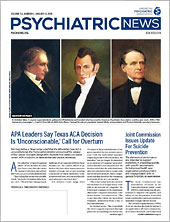In 1844, 13 superintendents of our young country’s institutions for people with mental illness came together for the purpose of improving the lives of the individuals under their care. The founders of what they named the Association of Medical Superintendents of American Institutions for the Insane were proponents of moral treatment—the idea that society should provide psychosocial care in a humane environment. One of the founders, Dr. Thomas Kirkbride, devised an architectural plan used in the building of many asylums for decades to come that featured natural light and abundant fresh air surrounded by spacious landscapes.
One hundred and seventy-five years later, the American Psychiatric Association—the flower of that first meeting in 1844—is marking a milestone in its remarkable history. A high point of the year will be a gala at San Francisco City Hall during APA’s 2019 Annual Meeting.
The celebration in San Francisco means a lot to me—and not just because it marks the culmination of my presidential year.
Remembering our roots is dear to me because I trained in Philadelphia and spent a career doing the kind of work in public mental health systems originally envisioned by the founders of what became APA. Today, there is a renewed emphasis on the social determinants of health—which I have tried to underscore during my presidency—and an understanding that real recovery depends on understanding the social context in which a person lives. I like to think that Thomas Kirkbride would smile on this development.
But owning our history also means owning the fact that sometimes we have fallen short of our ideals. “Not everything that is faced can be changed,” James Baldwin famously wrote. “But nothing can be changed that is not faced.” We need to face the fact that racism mars our country’s history from its colonial beginnings and even the history of our profession. One of APA’s founders, Dr. Francis Stribling, insisted there be a Committee on Asylums for Colored Persons, assuring the segregation of treatment by race. In addition, there is no publicly available evidence that in the 1950s APA supported overturning school segregation in the case Brown v. Board of Education. In response to a request by a prominent African-American member, Dr. Charles Prudhomme, to file an amicus brief in the case, he was told to “withdraw from involvement in the case and remain aloof from such a political issue.” Dr. Prudhomme went on to become APA vice president in the 1970s. In May 1969, a group of black psychiatrists led by Dr. Chester Pierce came to a meeting of the APA Board of Trustees demanding that APA acknowledge racism as a mental health problem and work to desegregate all public and private mental health facilities in the United States.
Understanding and facing our past can help us shape the future. We have an exciting opportunity to learn more about our history at the Annual Meeting in San Francisco, where APA and the APA Foundation will be sponsoring a special historical scientific program track. The track will include sessions on the history of psychiatry divided into four separate eras. Here are the four historical eras and their faculty chairs:
•
The advent of organized medicine in caring for people with mental illness (colonial times-1844): John Oldham, M.D.
•
The dawn of the modern era: reforms in care and treatment (1844-1944): Jeffrey Geller, M.D., M.P.H.
•
Advancing diagnosis, treatment, and education (1944-present): Carolyn Robinowitz, M.D.
•
Shaping the future of psychiatry: breakthroughs in research and delivery of clinical care (looking ahead): Josh Gordon, M.D., director of the National Institute of Mental Health.
Additionally, the history track will include a session on the history of global psychiatry chaired by Dr. Tsuyoshi Akiyama and sessions on the history of psychiatry as related to our minority and underrepresented groups. Those groups are American Indian, Alaska Native, and Native Hawaiian psychiatrists; Asian American psychiatrists; black psychiatrists; Hispanic psychiatrists; IMG psychiatrists; LGBTQ psychiatrists; and women psychiatrists. Look for detailed information in upcoming issues of Psychiatric News.
Finally, I would like to suggest that all of us have a stake in the history of our profession and can participate in its preservation. Last year, APA and the APA Foundation opened the Melvin Sabshin, M.D., Library and Archives at APA’s new headquarters in Washington, D.C. I invite you to search your personal archives for historical documents, books, and artifacts that might be worthy of preservation. Information about the library’s acquisition policy can be obtained by emailing
[email protected]. You can also help support the library through its
Adopt-a-Book program.
The history of our profession belongs to all of us. I look forward to celebrating it with you! ■

